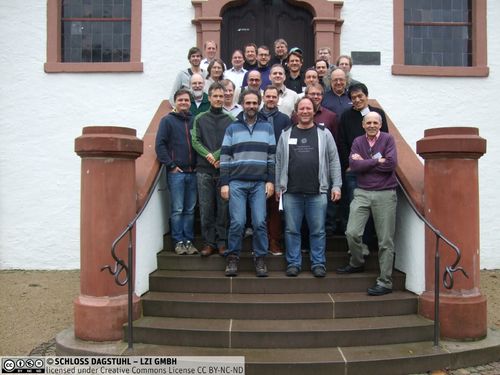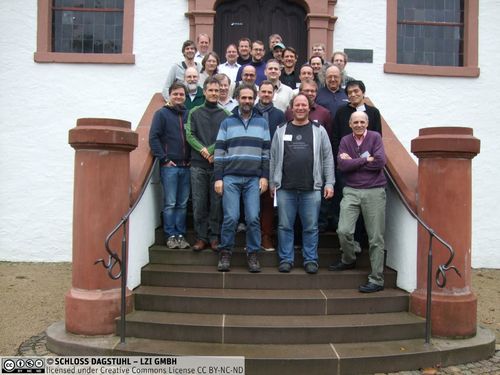Dagstuhl Seminar 14452
Algorithmic Cheminformatics
( Nov 02 – Nov 07, 2014 )
Permalink
Organizers
- Wolfgang Banzhaf (Memorial University of Newfoundland, CA)
- Christoph Flamm (Universität Wien, AT)
- Daniel Merkle (University of Southern Denmark - Odense, DK)
- Peter F. Stadler (Universität Leipzig, DE)
Contact
- Dagmar Glaser (for administrative matters)
The thriving field of bioinformatics/computational biology is a success story of a lively and extensive inter- and trans-disciplinary collaboration between life sciences and computer science. Unfortunately, it's much older cousin discipline Cheminformatics is far less developed. After a quick raise of a pletora of computational approaches for chemical problems in the 1960s - 1970s, the field mainly settled down on machine learning approaches in the late 1990s. Since that time computer science plays a comparably marginal role in chemistry research and education. This is a puzzling state of affairs as chemistry, and in particular the emerging field of systems chemistry, has to offer a wide range of non-trivial computational problems besides those arising in the well-established areas of quantum chemistry, molecular dynamics, or physical chemistry, for which physics-style models and numeric mathematics have proved the methods of choice. In particular, complex chemical networks capable of algorithmic self-assembly under far-from-equilibrium conditions, seem to possess a deep connection to the theory of computation, information recoding and compiler theory. The goal of this seminar is to establish the connection between theoretical computer science, graph theory and related fields of discrete mathematics, and complexity theory on the one hand and chemistry on the other hand. Examples of topics of the seminar include:
- graph rewriting and algebraic approaches for modeling chemical transformations
- systematic exploration of chemical spaces, including practical issues such as synthesis planning
- formal definitions and algorithmic approaches to structural properties of chemical spaces, such as chemical transformation motifs, set-wise catalysis and autocatalysis, and chemical organizations
- computational complexity questions in Cheminformatics and the necessary algorithms and data structures
- questions related to the classification and automatic inference of chemical reactions based on graph comparisons
- atomic-resolution models of chemical spaces, including practical issues such as atom-atom mapping and isotope-label tracing
- algorithmic aspects in the analysis of spectroscopic data, e.g. fragmentation trees in mass spectroscopy
In contrast to most other methods currently used for modeling chemistry, the atomic explicitness of graph-grammar based models allow for direct wet-lab experimental design and verification. They also have the potential to open new avenues for computational synthesis planning. Advanced wet-lab techniques like isotope-label tracing or measuring mass-to-charge ratios of fragments of compounds are well-established techniques in chemistry. However, multi-step atom tracing as well as compound inference based on a combination of fragmentation patterns and a thorough graph-theoretical modeling are basically uninvestigated fields from a theoretical CS perspective. For these reasons we intentionally invite wet-lab chemists from these research areas. The overall goal of this Dagstuhl seminar is to use the potential of the cross-boundary approaches in order to contribute to solving significant societal challenges related to chemistry.
Dagstuhl Seminar 14452 "Algorithmic Cheminformatics" was organized to intensify the interactions between chemistry and computer science. While the thriving field of bioinformatics/computational biology is a success story of a lively and extensive inter- and trans-disciplinary collaboration between life sciences and computer science, this is much less so in cheminformatics. After a quick raise of a plethora of computational approaches for chemical problems in the 1960--1970s, the field mainly settled down on machine learning approaches in the late 1990s. Over last two decades, computer science plays a comparably marginal role in chemistry research and education.
This is a puzzling state of affairs as chemistry, and in particular the emerging field of systems chemistry, has to offer a wide range of non-trivial computational problems that are very different from those in the well-established areas of quantum chemistry, molecular dynamics, or physical chemistry, for which physics-style models and numeric mathematics have been established as the methods of choice. In particular, complex chemical networks capable of algorithmic self-assembly under far-from-equilibrium conditions, seem to possess a deep connection to the theory of computation, information recoding and compiler theory. Dagstuhl Seminar 14452 therefore specifically aimed to establish the connection between theoretical computer science, graph theory and related fields of discrete mathematics, and complexity theory on the one hand and chemistry on the other hand. Several key areas where covered by one or more presentation and extensive discussions among the participants. Topic ranged from formalizing chemical transformations, autocatalytic molecular systems, and the design of chemical experiments, via model checking and key graph algorithm, to chemical information technology and models for the origin of life. Dagstuhl Seminar 14452 successfully brought together wet-lab chemists with theoretical computer scientists and researchers with a focus on bioinformatics and initiated an, as we feel, very fruitful frist step towards cross-boundary research.
 Wolfgang Banzhaf, Christoph Flamm, Daniel Merkle, and Peter F. Stadler
Wolfgang Banzhaf, Christoph Flamm, Daniel Merkle, and Peter F. Stadler
- Jakob Lykke Andersen (University of Southern Denmark - Odense, DK) [dblp]
- Carsten Baldauf (FHI - MPG Berlin, DE) [dblp]
- Wolfgang Banzhaf (Memorial University of Newfoundland, CA) [dblp]
- Nikolaj S. Bjørner (Microsoft Corporation - Redmond, US) [dblp]
- Sebastian Böcker (Universität Jena, DE) [dblp]
- David Dill (Stanford University, US) [dblp]
- Peter Dittrich (Universität Jena, DE) [dblp]
- Andreas Dress (Bielefeld, DE) [dblp]
- Rolf Fagerberg (University of Southern Denmark - Odense, DK) [dblp]
- Harold Fellermann (University of Newcastle, GB) [dblp]
- Christoph Flamm (Universität Wien, AT) [dblp]
- Martin Hanczyc (University of Trento, IT) [dblp]
- Marc Hellmuth (Universität des Saarlandes, DE) [dblp]
- Wim Hordijk (SmartAnalytiX.com - Lausanne, CH) [dblp]
- Takashi Ikegami (University of Tokyo, JP) [dblp]
- Ádám Kun (Eötvös Lorand University - Budapest, HU) [dblp]
- Barry McMullin (Dublin City University, IE) [dblp]
- Daniel Merkle (University of Southern Denmark - Odense, DK) [dblp]
- Markus E. Nebel (TU Kaiserslautern, DE) [dblp]
- Sijbren Otto (University of Groningen, NL)
- Adolfo Piperno (Sapienza University of Rome, IT) [dblp]
- D. Eric Smith (Santa Fe Institute, US) [dblp]
- Pietro Speroni di Fenizio (Dublin City University, IE) [dblp]
- Peter F. Stadler (Universität Leipzig, DE) [dblp]
- Darko Stefanovic (University of New Mexico - Albuquerque, US) [dblp]
- Ralf Steuer (HU Berlin, DE) [dblp]
- Klaus-Peter Zauner (University of Southampton, GB) [dblp]
Related Seminars
- Dagstuhl Seminar 17452: Algorithmic Cheminformatics (2017-11-05 - 2017-11-10) (Details)
Classification
- data structures / algorithms / complexity
- modelling / simulation
- networks
Keywords
- Graph Transformation Systems
- Graph and Hypergraph Invariants
- Graph Comparison
- Network Flows
- Hypergraphs
- Formal Languages
- Algebraic Chemistry



 Creative Commons BY 3.0 Unported license
Creative Commons BY 3.0 Unported license
